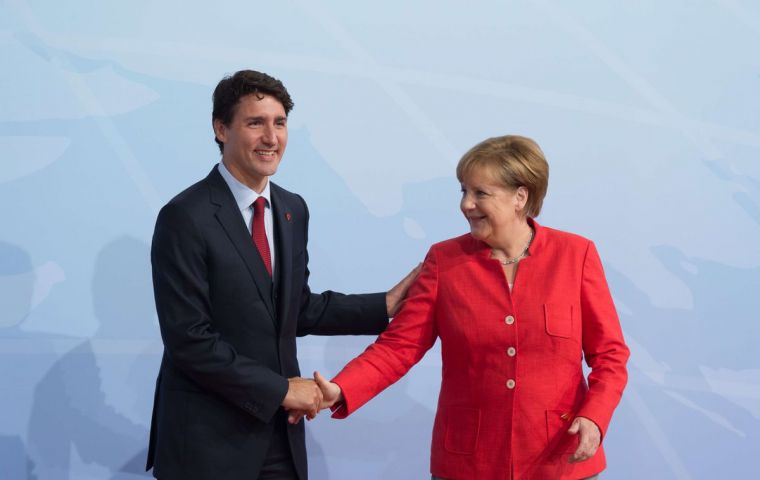MercoPress. South Atlantic News Agency
Trudeau and Merkel, most respected global leaders; Trump and Putin, with highest disapproval
 Canada’s Prime Minister Justin Trudeau and Germany’s Chancellor Angela Merkel are viewed as the most respected globally,
Canada’s Prime Minister Justin Trudeau and Germany’s Chancellor Angela Merkel are viewed as the most respected globally, Canada’s Prime Minister Justin Trudeau and Germany’s Chancellor Angela Merkel are viewed as the most respected globally, while U.S. President Donald Trump and Russian President Vladimir Putin saw the highest disapproval ratings.
Among top business leaders, Eric Schmidt, executive chairman of Google’s parent company Alphabet, was the most respected.
In its third year, the rankings evaluate 80 countries across a range of criteria, from economic influence and power to citizenship and quality of life, to capture how nations are perceived on a global scale.
The key factors were based on the following criteria
Entrepreneurship – Adventure – Citizenship – Cultural Influence – Heritage – Movers -Open for Business Power – Quality of Life
A list of the top 25 countries in the world: Switzerland; Canada; Germany; United Kingdom; Japan; Sweden; Australia; USA; France; The Netherlands; Denmark; Norway; New Zealand; Finland; Italy; Singapore; Austria; Luxembourg; Spain; China; Ireland; South Korea; United Arab Emirates; Portugal; India
Key Findings in the 2018 Best Countries Report:
Switzerland is No. 1, followed by No. 2 Canada, as countries with more progressive social and environmental policies dominate the overall rankings. Nordic nations – Sweden, Finland, Denmark and Norway – rank in the top 15 overall. Denmark is the No. 1 country for raising children and for women. Sweden takes the top spot for green living, and Norway ranks at the top for citizenship.
Germany moved up one spot to No. 3, replacing the U.K., which fell to No. 4. Germany’s reputation as an open nation with government transparency and strong gender equality led to its rise in the rankings. The U.K.’s drop, however, signals a growing lack of confidence in its economic strength post-Brexit.
Japan remains at No. 5, scoring high marks in entrepreneurship, up-and coming economics and rich traditions. Singapore and China, at No. 16 and No. 20 respectively, follow among the highest ranked countries in Asia. Both nations are viewed as having a strong potential for economic growth.
The U.S. falls one spot to No. 8, after No. 6 Sweden and No. 7 Australia. It drops in two important categories: open for business, which looks at market-oriented countries, and movers, which evaluates nations with up-and-coming economies. Perceptions of the U.S. as politically stable, democratic and having an open travel policy have decreased. However, the nation remains No. 1 in power for the third year, closely followed by Russia at No. 2.
Luxembourg is the most business-friendly nation, Germany is No. 1 in entrepreneurship and Switzerland is the best to headquarter corporation. The U.K. leads in education Canada is No. 1 for quality of life and New Zealand is the favorite for retirement. Brazil is the No. 1 country to visit, and Italy ranks highest as the nation with the richest traditions.
“For the countries that rose to the top of this year’s rankings, it is once again clear that military vigor and economic power are no longer the key determinants to a country’s brand success. The Best Countries rankings continue to show us that just as brands must focus on a wide range of attributes to raise profiles and win over audiences, nations that are multidimensional and that reflect a wider range of qualities, such as innovation and compassion, have the brand appeal that propels them on the global stage,” said David Sable, Y&R Global CEO.
The 2018 Best Countries ranking methodology relies on data gathered from a proprietary survey of more than 21,000 business leaders, informed elites and general citizens. “The Best Countries report speaks to the effect a nation’s brand can have on its economic prosperity and perceived standing in the world,” said David Reibstein, professor of marketing at the Wharton School.




Top Comments
Disclaimer & comment rules-

Read all commentsI am not sure about Merkel any more, nor are millions of Germans which is why she is in so much trouble. My Bavarian collegues are incandescent. Letting in a million immigrants at once has done for her, the consequences will be felt for many years. Many cities will become just like Blackburn with cultures that progressively grow further apart with separation of schools and worship and disadvantaged young immigrants taking up the bomb and bullet to express their rage. Many West Germans are still smarting from the expense of assimilating East Germany and the negative effects on the quality of their retirements, Merkels actions have just made things worse.
Jan 24th, 2018 - 11:23 am 0Commenting for this story is now closed.
If you have a Facebook account, become a fan and comment on our Facebook Page!